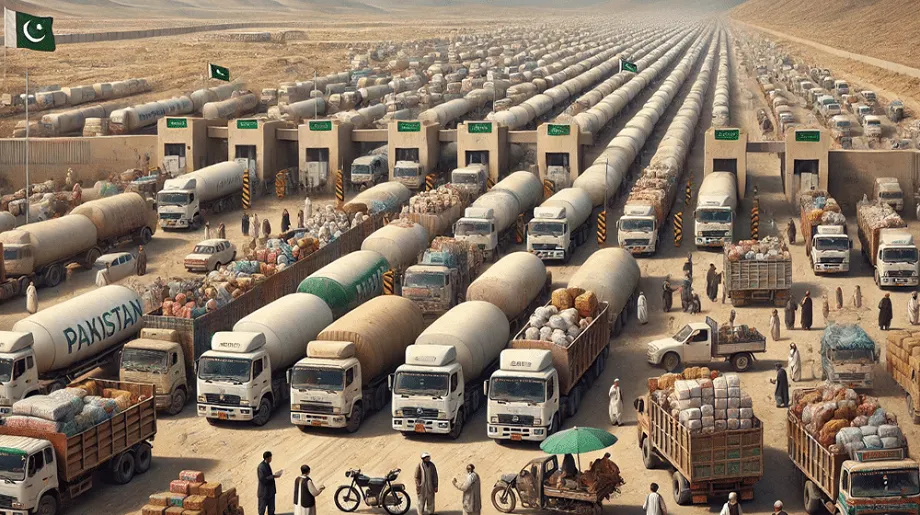Islamabad: Ongoing issue of 1,200 Iranian trucks stuck at the Iranian border and the challenges surrounding Pakistan-Iran barter trade.
The Ministry of Commerce is set to present a fresh summary to the federal cabinet for a waiver of the Import-Form (I-Form) condition for Iran and Afghanistan.
Additionally, the barter trade policy between Pakistan and Iran is to be revised to resolve issues that have been hindering trade, particularly due to bureaucratic delays and policy confusion.
Key points from the article:
-
Stuck Iranian Trucks:
-
There are currently 1,200 Iranian trucks stuck at the Iranian border due to trade policy confusion.
-
Pakistani customs authorities were initially unaware of the situation, stating that no Iranian trucks had been cleared for entry.
-
The Ministry of Commerce, however, confirmed that the issue existed, and a draft summary for a policy change was already endorsed by the State Bank of Pakistan (SBP).
-
-
Barter Trade Policy Revision:
-
The Senate Standing Committees on Commerce and Finance held a joint meeting to address the inefficiencies in the barter trade system between Pakistan and Iran.
-
The existing policy is considered ineffective due to confusion between two overlapping trade policies—the Barter Trade Policy, which allows only Iranian-origin goods, and the Import Policy Order, which requires an I-Form for all imports.
-
The committees agreed to revise the barter trade policy to ensure that no party—Pakistan or Iran—faces disadvantages in trade.
-
-
Bureaucratic Challenges:
-
The meeting highlighted the bureaucratic inertia and ineffective practices of Pakistan Customs, which were preventing the smooth flow of trade.
-
There is also a lack of clarity in how the barter trade mechanism works, especially since there is no official banking channel to facilitate financial transactions between the two countries.
-
Iranian truckers are required to provide a bank guarantee, but without a functioning financial system, this is practically impossible.
-
Read More: Pakistan and Iran Emphasize Importance of Building Mutually Beneficial Cooperation
-
Policy Overlap:
-
The overlap between the Barter Trade Policy (which only permits Iranian goods) and the Import Policy Order (which mandates the I-Form for imports) has rendered the barter trade system dysfunctional.
-
This overlap has caused delays in imports and exports, and traders are discouraged from using legal trade channels due to the complexity of the process.
-
-
Senate Committee’s Displeasure:
-
Both committees expressed frustration over the absence of key officials, including the Secretary of Commerce and the Minister for Commerce, and threatened to move a privilege motion against the Collector of Customs for not attending the meeting despite being instructed to do so.
-
There was strong criticism of the bureaucratic inertia that has led to stagnation in trade, and committee members emphasized that without reform, Pakistan’s trade potential would continue to be hampered.
-
-
Resolution:
-
The joint committee agreed to work on a revised barter trade policy that would eliminate confusion and ensure smoother trade between Pakistan and Iran.
-
The revised policy would first be vetted by the joint committee before being presented to the federal cabinet for approval. The committee has given 10 days for a report on this matter.
-
In summary, the issue of Iranian trucks stuck at the border is a symptom of larger bureaucratic inefficiencies and policy overlaps that hinder trade.
Also Read: Pakistan, Iran for promoting bilateral trade ties, business activities at border areas
The proposed revisions to the barter trade policy aim to address these challenges and facilitate smoother cross-border trade between Pakistan and Iran.
